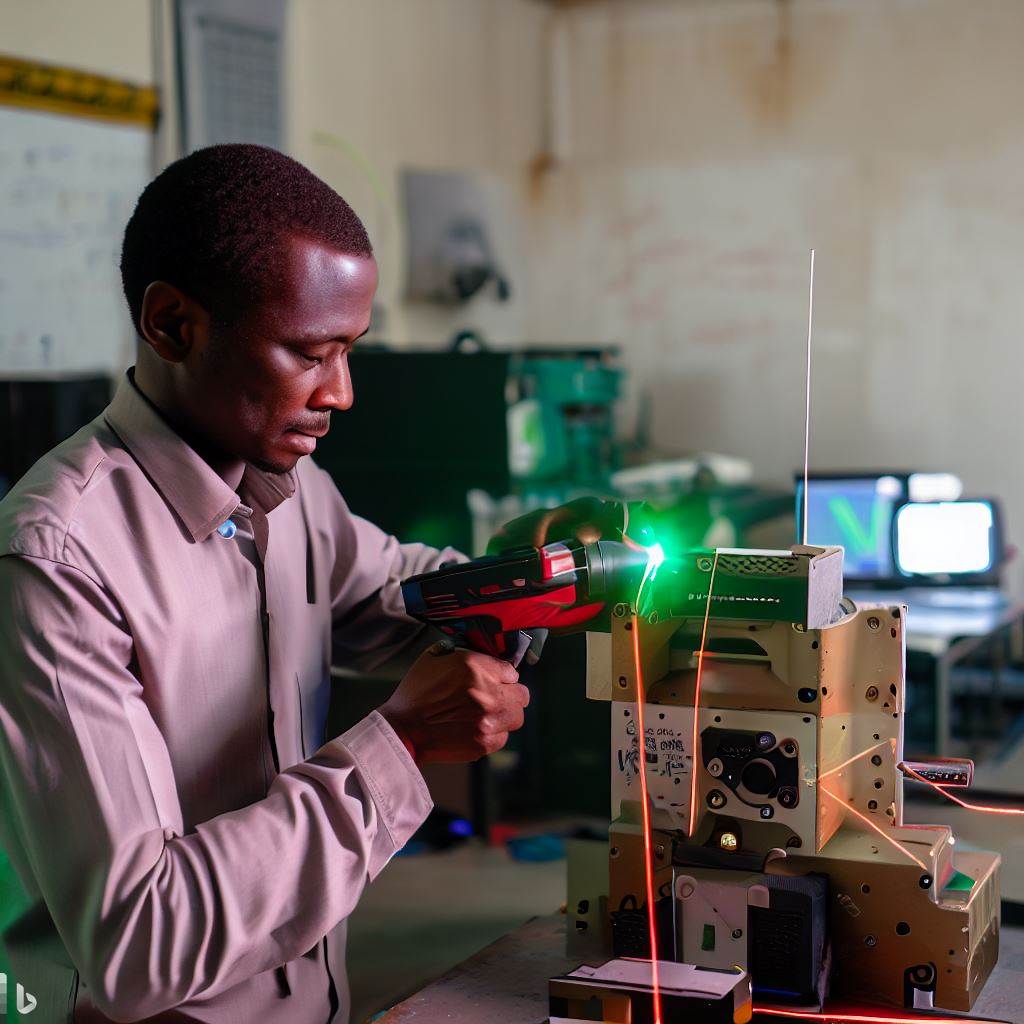Introduction
Briefly Explain the Concept of Innovative Projects
Innovative Projects by Opto-Mechanical Engineers are groundbreaking initiatives that introduce new ideas, methods, or products.
Innovative projects involve creating novel solutions that push the boundaries of technology and address complex challenges.
Introduce the Role of Opto-Mechanical Engineers in Nigeria
Opto-mechanical engineers in Nigeria play a crucial role in designing and implementing cutting-edge optical-mechanical systems.
Thesis Statement
This Blog Post Will Explore Innovative Projects by Opto-Mechanical Engineers in Nigeria and Highlight Their Contributions to Various Sectors
- Telecommunications Advancements: Opto-mechanical engineers enhance fiber optic networks, improving communication infrastructure.
- Medical Device Innovations: They develop precision medical instruments, advancing healthcare services across the country.
- Agricultural Technology: Opto-mechanical solutions optimize farming practices, promoting sustainable agriculture.
- Robotics and Automation: Engineers create intelligent robotic systems, boosting efficiency in manufacturing and industries.
- Renewable Energy: They contribute to solar energy projects, expanding Nigeria’s clean energy capabilities.
By exploring these projects, we celebrate the ingenuity of Nigerian opto-mechanical engineers and their impact on diverse sectors.
Overview of Opto-Mechanical Engineering in Nigeria
- Definition and scope of opto-mechanical engineering: Opto-mechanical engineering is a field that combines optics, mechanics, and electronics to design and develop innovative systems and devices.
- Discuss the demand and growth of this field in Nigeria: The demand for opto-mechanical engineers in Nigeria has been steadily growing due to advancements in technology and the need for innovative solutions.
- Highlight the importance of opto-mechanical engineers in various industries: Opto-mechanical engineers play a crucial role in industries such as telecommunications, healthcare, manufacturing, and defense.
Opto-mechanical engineering integrates optics, mechanics, and electronics to develop innovative systems for Nigeria’s industries.
Its demand is rising due to technology advancements and the need for cutting-edge solutions.
In the telecommunications industry, opto-mechanical engineers design efficient optical communication systems with fiber optics and lasers.
Healthcare benefits from opto-mechanical engineers developing advanced medical imaging systems and optical instruments for diagnostics and surgeries.
The manufacturing industry improves efficiency and accuracy with opto-mechanical engineers optimizing processes like precision machining and 3D printing.
In defense, these engineers contribute to advanced surveillance systems, night vision devices, and precision targeting systems, enhancing national security.
Academic and government research sectors utilize opto-mechanical engineers to explore new technologies and drive scientific advancements.
Opto-mechanical engineering holds immense importance in Nigeria, driving technological advancements and economic growth across various sectors.
Read: How to Navigate the Job Market as an Opto-Mechanical Engineer
Innovative Projects in Renewable Energy Sector
The Role of Opto-Mechanical Engineering in Solar Power Systems
- Solar panel design and optimization
- Tracking systems for maximum energy generation
Transformative Impact: Successful Projects Revolutionizing Nigeria’s Energy Sector
- Solar-powered community centers in rural areas
- Solar street lights for improved safety and security
Opto-mechanical engineering plays a vital role in advancing renewable energy technologies in Nigeria.
In particular, this discipline has contributed significantly to the development and implementation of innovative projects in the solar power sector.
Use of opto-mechanical engineering in solar power systems
- Solar panel design and optimization: Opto-mechanical engineers are responsible for designing solar panels that are efficient and durable.
They use their expertise to enhance the performance and reliability of solar panels, leading to increased energy production. - Tracking systems for maximum energy generation: Opto-mechanical engineers design and implement tracking systems that allow solar panels to follow the sun’s movement throughout the day.
This maximizes energy generation by ensuring panels are always at the optimum angle to receive sunlight.
Successful projects and their impact on Nigeria’s energy sector
- Solar-powered community centers in rural areas: Opto-mechanical engineers have successfully collaborated with other stakeholders to establish solar-powered community centers in remote regions of Nigeria.
These centers provide electricity for essential services such as schools, healthcare facilities, and community gathering spaces. They have significantly improved the quality of life for people living in these underserved areas. - Solar street lights for improved safety and security: Opto-mechanical engineers have also implemented solar-powered street lighting systems in various Nigerian cities.
These lights use renewable energy to illuminate public spaces, ensuring better visibility at night and enhancing safety for pedestrians and motorists. This initiative has had a positive impact on reducing crime rates and promoting a sense of security in the community.
Opto-mechanical engineering techniques have profoundly impacted Nigeria’s energy sector by harnessing solar power for sustainable development.
The projects diversified energy sources, reduced reliance on fossil fuels, and mitigated climate change.
Renewable energy initiatives bloomed, creating jobs and promoting economic growth, while advancing technology in Nigeria.
Skilled opto-mechanical engineers played a pivotal role in solar panel design and optimization, revolutionizing efficiency and effectiveness.
Solar-powered community centers and street lights transformed Nigeria’s energy landscape, elevating living standards, safety, and sustainable development.
The expertise gained paved the way for additional renewable energy initiatives.
Read: Day in the Life: Routine of a Nigerian Flight Engineer
Application of Opto-Mechanical Engineering in Biomedical Field
Role of Opto-Mechanical Engineers in Medical Equipment Development
Opto-mechanical engineers play a crucial role in the development of medical equipment.
They integrate optical and mechanical principles to design cutting-edge devices used in diagnostics, treatment, and research.
Medical equipment such as imaging devices, surgical instruments, and diagnostic tools require high precision and reliability.
Opto-mechanical engineers ensure that these devices meet the demanding standards of the healthcare industry.
Their expertise lies in the design and integration of optical components to enhance the performance of medical devices.
By understanding the behavior of light and materials, they can optimize the capabilities of these instruments.
Innovative Biomedical Projects in Nigeria
- Design and Development of Optical Imaging Devices: Opto-mechanical engineers in Nigeria have been involved in the creation of advanced optical imaging devices.
These instruments utilize optics and electronics to capture high-resolution images of tissues and organs. - Creation of Precision Surgical Instruments: Another area where opto-mechanical engineers have made significant contributions is in the development of precision surgical instruments.
These tools incorporate optical elements to improve accuracy during surgical procedures.
Showcase of Success Stories and Contributions to the Healthcare Sector
The innovative biomedical projects spearheaded by opto-mechanical engineers in Nigeria have had a substantial impact on the healthcare sector. Here are a few success stories:
- Optical Coherence Tomography (OCT) Imaging: Opto-mechanical engineers collaborated with medical professionals to design and implement OCT imaging systems.
These devices provide non-invasive imaging of biological tissues, aiding in the diagnosis and monitoring of various diseases. - Laser-Assisted Cataract Surgery: Through the integration of lasers into surgical instruments, opto-mechanical engineers have revolutionized cataract surgery.
This technique improves precision and enhances patient outcomes, reducing the risk of complications. - Development of Intraocular Lenses: Opto-mechanical engineers have worked on the design and fabrication of intraocular lenses used in cataract surgery.
These lenses are crucial for restoring vision and improving the quality of life for patients affected by cataracts. - Portable Point-of-Care Diagnostic Devices: By combining optics, electronics, and microfluidics, opto-mechanical engineers have developed portable point-of-care diagnostic devices.
These devices enable rapid and accurate detection of diseases such as malaria and HIV in remote areas with limited access to healthcare facilities. - Opto-Mechanical Systems for Rehabilitation: Opto-mechanical engineers have collaborated with physiotherapists to create innovative systems for rehabilitation.
These systems utilize motion capture technologies and optical sensors to monitor and analyze the movement of patients during therapy sessions.
The success of these projects highlights the vital role that opto-mechanical engineers play in the advancement of healthcare technology in Nigeria.
Their contributions have improved diagnosis, treatment, and patient outcomes across various medical disciplines.
In short, opto-mechanical engineers in Nigeria are at the forefront of innovative projects.
Their expertise in integrating optical and mechanical principles has led to the development of cutting-edge medical devices, imaging systems, and precision surgical instruments.
These projects have contributed significantly to the healthcare sector, improving diagnostics, treatment, and patient care.
Read: Journey of Female Flight Engineers in Nigeria’s Aviation

See Related Content: Overcoming Challenges in Nigeria’s Chemical Engineering Field
Opto-Mechanical Engineering in Manufacturing and Automation
Revolutionizing Industrial Automation: The Role of Opto-Mechanical Engineering
Opto-mechanical engineers play a crucial role in industrial automation. They are involved in the design and implementation of automated optical inspection systems.
These systems utilize optical technology to inspect products and identify defects. Integration of optical sensors is a key aspect of quality control in manufacturing processes.
Opto-mechanical engineers are responsible for ensuring the accuracy and reliability of these sensors. They work closely with other engineers and technicians to optimize the performance of the automated systems.
Through their expertise, they contribute to improving efficiency and reducing human error in manufacturing.
Automation driven by opto-mechanical engineering has become vital in various industries, such as automotive, electronics, and pharmaceutical.
Optical inspection systems help streamline production processes and enhance product quality. They eliminate the need for manual inspection, which can be time-consuming and prone to errors.
Furthermore, opto-mechanical engineers ensure that these inspection systems are cost-effective for manufacturing companies.
Highlight innovative projects in the manufacturing sector
- Precision Optical Inspection Systems: Opto-mechanical engineers have developed high-precision optical inspection systems that ensure quality control and detect defects in manufacturing processes, leading to reduced waste and increased productivity.
- Automated Assembly Lines: They have designed and implemented automated assembly lines with integrated optical sensors and vision systems.
These systems enable precise positioning and alignment of components, resulting in faster production and improved product consistency.
Opto-mechanical engineering plays a crucial role in the development and implementation of these innovative systems.
With the continuous advancements in technology, opto-mechanical engineers are constantly finding new ways to improve manufacturing processes.
They strive to enhance automation, increase productivity, and ensure the overall success of the manufacturing sector in Nigeria.
In short, opto-mechanical engineering is essential for industrial automation and improving manufacturing processes in Nigeria.
Through the design and implementation of automated inspection systems and integration of optical sensors, opto-mechanical engineers contribute to quality control and efficiency.
The innovative projects in the manufacturing sector, such as high-speed optical sorting machines for agricultural produce and automated optical metrology systems for precision manufacturing, demonstrate the impact of opto-mechanical engineering in Nigeria’s manufacturing industry.
These projects enhance productivity, reduce errors, and support the overall growth and development of the sector.
Read: Top Universities to Study Opto-Mechanical Engineering in Nigeria
Challenges and Future Opportunities
Challenges Faced by Opto-Mechanical Engineers in Nigeria
- Limited research and development facilities: One of the major challenges faced by opto-mechanical engineers in Nigeria is the lack of adequate research and development facilities.
This hinders their ability to innovate and develop new projects. - Lack of awareness and financial support: Opto-mechanical engineers in Nigeria face the challenge of limited awareness about their field among the general population, as well as the lack of financial support to fund their projects.
Present potential opportunities for growth and innovation in the field
- Collaborations with international organizations and academia: Opto-mechanical engineers in Nigeria can seize opportunities for growth and innovation by establishing collaborations with international organizations and academia.
This would allow for knowledge exchange and access to resources. - Government initiatives to support research and development: The Nigerian government can play a crucial role in fostering growth and innovation in opto-mechanical engineering by implementing initiatives that provide financial support and favorable policies for research and development in the field.
Opto-mechanical engineering in Nigeria faces challenges hindering growth and innovation: limited research facilities, lack of awareness, and insufficient financial support.
Engineers need advanced labs and equipment for research; however, such facilities are scarce, hampering exploration and innovation.
General population’s unawareness of opto-mechanical field hinders growth and job opportunities for engineers.
Lack of financial backing limits engineers’ ability to acquire necessary resources and carry out effective work.
Opportunities for growth exist: collaborations with international organizations and academia can provide expertise and funding.
Government initiatives supporting R&D can create a conducive environment for opto-mechanical engineering’s growth.
Allocate funds for research, develop policies that encourage investment, and provide financial incentives and technical support.
Addressing these challenges will pave the way for groundbreaking projects and technological advancement in Nigeria.
You Might Also Like: Nigeria’s Optical Engineering Field: Outlook 2023 and Beyond
Conclusion
A recap of the main points discussed in the blog post
Opto-Mechanical engineers are playing a crucial role in Nigeria’s innovative projects. They have successfully implemented various optical and mechanical principles.
Opto-Mechanical engineers are the driving force behind technological breakthroughs and progress in Nigeria. Their expertise in combining optics and mechanics is vital for creating innovative solutions.
These engineers have contributed to advancements in fields like healthcare, telecommunications, and agriculture. They have designed cutting-edge devices and systems for improved efficiency and productivity.
Emphasizing the importance of opto-mechanical engineers and their contributions
Opto-Mechanical engineers are the driving force behind technological breakthroughs and progress in Nigeria. Their expertise in combining optics and mechanics is vital for creating innovative solutions.
Their contributions have made a significant impact on various sectors of the economy, enhancing the quality of life for Nigerians. Without their skills and knowledge, many projects would not have been possible.
Leaving the readers with a positive outlook on the future of opto-mechanical engineering in Nigeria
Looking ahead, the future of opto-mechanical engineering in Nigeria is promising. The demand for skilled professionals in this field will continue to rise as more industries recognize the value of their expertise.
With the relentless pursuit of innovation and the commitment of opto-mechanical engineers, Nigeria will witness remarkable advancements and benefit from cutting-edge technologies in the coming years.




